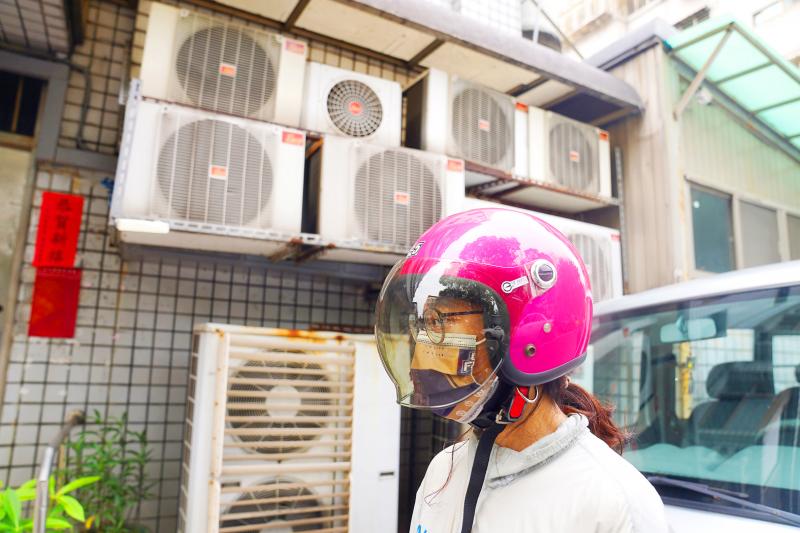The power supply system yesterday flashed a “yellow” alert after a coal-fired generator in Taichung broke down earlier in the day, state-run utility Taiwan Power Co (Taipower, 台電) said.
At noon, power consumption nationwide reached 36,604 megawatts (MW), or 91 percent of capacity, triggering the “yellow” alert, signaling an operating reserve margin of 6 to 10 percent of total supply, Taipower said.
The maximum power supply yesterday was 39,838MW and, during periods of peak consumption, the operating reserve margin was expected to fall to 7.67 percent of total supply, or 2,838MW, it said.

Photo: CNA
The No. 9 generator at the Taichung Power Plant went offline at about 4am yesterday due to a pipeline shutdown, but the power supply was not interrupted for long, because the plant’s No. 6 generator was activated and connected to the grid at 8:20am.
For this month, Taipower said that it raised its projected daily average peak power consumption from 35,000MW to a range of 37,200MW to 37,500MW.
The operating reserve remains at 7 to 8 percent, but power rationing is not likely, despite the tight supply, it added.
Taipower had predicted a tight power supply for this week, saying that a “yellow” alert was expected from yesterday to Friday, mainly due to heavy demand, as well as generators undergoing annual maintenance at four of its power plants.
In Keelung, maintenance on the Hsieh-ho Power Plant’s (協和電廠) fourth oil-fired generator is to be completed on June 17.
In Kaohsiung, maintenance on the Hsinta Power Plant’s (興達電廠) No. 2 gas-fired generator is to be completed on June 28, while maintenance on the Dalin Power Plant’s (大林電廠) No. 6 gas-fired generator is to be completed on July 11.
In Taoyuan, work on the Tatan Power Plant’s (大潭電廠) No. 6 gas-fired generator is to be completed on July 19.
To ensure a stable supply of power, Taipower has increased purchases of electricity from private utilities and asked companies that use a large amount of electricity to reduce their consumption after 4pm, when solar panels no longer produce electricity, Minister of Economic Affairs Wang Mei-hua (王美花) previously said.

CAUTIOUS RECOVERY: While the manufacturing sector returned to growth amid the US-China trade truce, firms remain wary as uncertainty clouds the outlook, the CIER said The local manufacturing sector returned to expansion last month, as the official purchasing managers’ index (PMI) rose 2.1 points to 51.0, driven by a temporary easing in US-China trade tensions, the Chung-Hua Institution for Economic Research (CIER, 中華經濟研究院) said yesterday. The PMI gauges the health of the manufacturing industry, with readings above 50 indicating expansion and those below 50 signaling contraction. “Firms are not as pessimistic as they were in April, but they remain far from optimistic,” CIER president Lien Hsien-ming (連賢明) said at a news conference. The full impact of US tariff decisions is unlikely to become clear until later this month

GROWING CONCERN: Some senior Trump administration officials opposed the UAE expansion over fears that another TSMC project could jeopardize its US investment Taiwan Semiconductor Manufacturing Co (TSMC, 台積電) is evaluating building an advanced production facility in the United Arab Emirates (UAE) and has discussed the possibility with officials in US President Donald Trump’s administration, people familiar with the matter said, in a potentially major bet on the Middle East that would only come to fruition with Washington’s approval. The company has had multiple meetings in the past few months with US Special Envoy to the Middle East Steve Witkoff and officials from MGX, an influential investment vehicle overseen by the UAE president’s brother, the people said. The conversations are a continuation of talks that

CHIP DUTIES: TSMC said it voiced its concerns to Washington about tariffs, telling the US commerce department that it wants ‘fair treatment’ to protect its competitiveness Taiwan Semiconductor Manufacturing Co (TSMC, 台積電) yesterday reiterated robust business prospects for this year as strong artificial intelligence (AI) chip demand from Nvidia Corp and other customers would absorb the impacts of US tariffs. “The impact of tariffs would be indirect, as the custom tax is the importers’ responsibility, not the exporters,” TSMC chairman and chief executive officer C.C. Wei (魏哲家) said at the chipmaker’s annual shareholders’ meeting in Hsinchu City. TSMC’s business could be affected if people become reluctant to buy electronics due to inflated prices, Wei said. In addition, the chipmaker has voiced its concern to the US Department of Commerce

STILL LOADED: Last year’s richest person, Quanta Computer Inc chairman Barry Lam, dropped to second place despite an 8 percent increase in his wealth to US$12.6 billion Staff writer, with CNA Daniel Tsai (蔡明忠) and Richard Tsai (蔡明興), the brothers who run Fubon Group (富邦集團), topped the Forbes list of Taiwan’s 50 richest people this year, released on Wednesday in New York. The magazine said that a stronger New Taiwan dollar pushed the combined wealth of Taiwan’s 50 richest people up 13 percent, from US$174 billion to US$197 billion, with 36 of the people on the list seeing their wealth increase. That came as Taiwan’s economy grew 4.6 percent last year, its fastest pace in three years, driven by the strong performance of the semiconductor industry, the magazine said. The Tsai